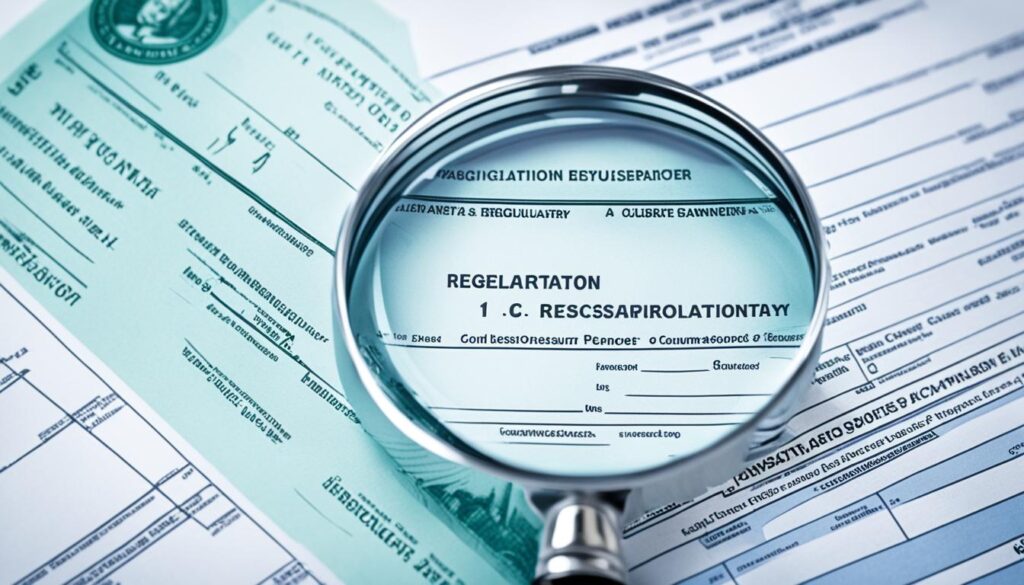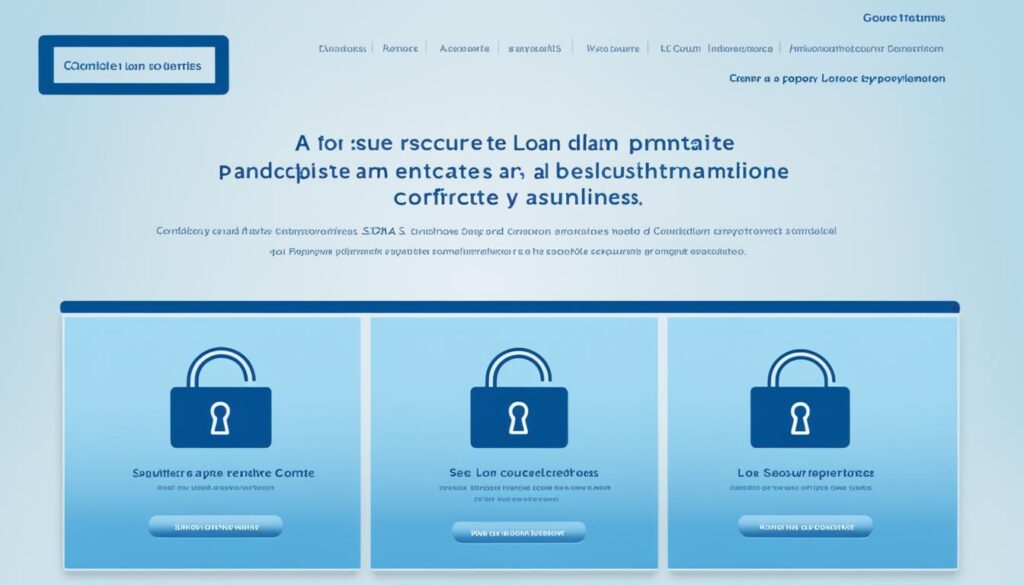According to the Federal Trade Commission (FTC), consumers lost nearly $5.8 billion collectively to fraudulent practices in 2021. To avoid falling victim to personal loan scams, it’s crucial to learn how to verify the legitimacy of a loan company before you provide any personal information or agree to any loan offers. By being aware of the red flags and taking certain precautionary measures, you can protect yourself from becoming a victim of a personal loan pro scam.
Key Takeaways:
- Verify a loan company’s registration in your state
- Avoid upfront payment requests
- Be cautious of cold calls and door-to-door offers
- Check the physical address of the loan company
- Avoid high-pressure tactics and urgency
Signs of a Personal Loan Pro Scam
When looking for a personal loan, it’s important to be aware of the signs that indicate you might be dealing with a scam. By recognizing these warning signals, you can protect yourself from potential financial fraud and make informed decisions. Here are some key signs to watch out for:
- Unrealistic Loan Guarantees: Reputable lenders do not guarantee loan approval for everyone, especially if you have bad credit or no credit history. Be cautious of lenders who promise guaranteed loan approval without considering your creditworthiness.
- Unregistered Lenders: Scammers often operate without proper registration in the states where they conduct business. Before engaging with a lender, verify their registration status to ensure they are legitimate and authorized to offer loans in your state.
Remember, personal loan guarantees and unregistered lenders are potential red flags that may indicate a scam. Stay vigilant and take the necessary precautions.
If you come across any of these signs, it’s crucial to proceed with caution and investigate further. Protect yourself from personal loan scams by conducting thorough research, verifying the credibility of lenders, and trusting your instincts. Remember, being well-informed is your best defense against financial fraud.
To help you in your quest for avoiding personal loan scams, here is a table comparing the characteristics of legitimate lenders and potential scammers:
| Legitimate Lenders | Potential Scammers | |
|---|---|---|
| Loan Approval | Based on creditworthiness and other factors | Guaranteed approval for everyone |
| Registration | Properly registered in states where they operate | Operate without proper registration |
| Fees | Transparent and reasonable fees | Upfront fees and payment requests |
| Communication | Professional and transparent communication | Unsolicited cold calls or door-to-door offers |
| Website Security | Secure website with HTTPS protocol | Insecure website or lack of proper security measures |
By comparing these characteristics, you can differentiate between legitimate lenders and potential scammers, making it easier to make informed decisions when seeking a personal loan.
Checking Loan Company Registration

The Federal Trade Commission (FTC) mandates that lenders and loan brokers register in the states where they conduct business. Verifying a loan company’s registration is an essential step in determining its legitimacy. To ensure that you are dealing with a reputable lender, follow these steps to check their registration status:
- Visit the loan company’s official website.
- Look for a section that provides information about their registration.
- Check the list of states where the company is registered.
- Ensure that your state is included in the list.
If the loan company is not registered in your state, it could be a sign of a personal loan pro scam. Registered lenders adhere to state regulations and are more likely to be trustworthy. Always verify a lender’s registration in your state before sharing any personal or financial information.
Upfront Payment Requests

Legitimate lenders understand that accessing personal loan funds should not require upfront payment. However, scammers often employ deceptive tactics, requesting prepaid debit cards, gift cards, or sensitive banking information under the guise of insurance, collateral, or fees. It’s crucial to exercise caution when dealing with any lender that demands payment before providing your loan proceeds.
Legitimate loan fees can include application fees, appraisal fees, or credit report fees. However, these fees are typically deducted from the loan amount and not required upfront. Be wary of lenders who ask for upfront fees, as it is a common red flag for personal loan scams.
If a lender requests payment using prepaid debit cards or insists on immediate payment before providing your loan proceeds, it’s best to proceed with caution and investigate further. Remember, reputable lenders prioritize transparency and ensure the loan process is clear and fair without unexpected upfront expenses.
Pro Tip: Take the time to review all loan terms and conditions before accepting any offers. Legitimate lenders will provide clear and comprehensive information about fees, interest rates, and repayment terms.
By staying cautious and informed, you can protect yourself from personal loan scams and avoid falling victim to fraudulent upfront payment requests. Remember, legitimate lenders will never require immediate payment before providing your loan funds. Prioritize thorough research, verify the legitimacy of any loan company, and only proceed with loan offers that align with your financial goals and needs.
Cold Calls and Door-to-Door Offers

Reputable lenders do not typically offer loans through unsolicited phone calls, mail, or door-to-door solicitations. As a consumer, it’s essential to be cautious of loan offers that come through these channels, as they may be part of a personal loan scam. Legitimate lenders follow proper protocols and do not engage in such practices.
If you receive a loan offer through a phone call or unsolicited visit, it’s important to be skeptical and not provide any personal or financial information right away. Scammers often use these methods to trick consumers into divulging sensitive data that can be used for fraudulent purposes.
One way to protect yourself is to contact the lender directly through their official website or customer service hotline. This allows you to verify the legitimacy of the loan offer and ensure that you are dealing with a reputable lender.
Remember: Do not provide any personal or financial information to unsolicited callers or door-to-door representatives without verifying their legitimacy first.
By taking these precautions, you can avoid falling victim to personal loan scams and protect your personal and financial information.
Image: Loan offers through phone calls and door-to-door loan solicitations
Physical Address Verification

When applying for a personal loan, it’s important to ensure that you are dealing with a legitimate lender. One way to verify a lender’s legitimacy is by checking for a physical location or address on their website.
Legitimate lenders understand the importance of transparency and provide their address to instill trust in their customers. Having a physical address is a sign that the lender is credible and operates in a legitimate manner.
To verify the lender’s address, you can use Google Maps. Simply input the address provided on the lender’s website and see if it matches the location displayed on Google Maps. This step is essential as it helps you confirm that the address is genuine.
Be cautious of lenders who fail to provide a verifiable physical address or whose address doesn’t exist on Google Maps. Some scammers may list vacant lots or fake addresses to appear legitimate. That’s why it’s crucial to conduct this verification process and avoid doing business with lenders that raise any doubts about their address.
Pressure Tactics and Urgency

Scammers often employ high-pressure tactics to manipulate borrowers into making hasty decisions. They use various techniques to create a false sense of urgency, such as imposing immediate deadlines or making unsubstantiated claims about negative consequences if you fail to act swiftly. It is crucial to be vigilant and avoid succumbing to these tactics when considering loan offers.
Reputable lenders understand the significance of informed decision-making and provide borrowers with sufficient time to evaluate loan options carefully. By taking the necessary time to research and verify the legitimacy of a loan company, you can protect yourself from falling victim to fraud. Remember, haste can lead to poor judgments and potential financial losses.
Avoid high-pressure loan offers and immediate deadlines. Take the necessary time to make well-informed decisions and safeguard your financial well-being.
Website Security

When it comes to personal loan transactions, ensuring the security of your personal information is of utmost importance. Legitimate lenders prioritize the protection of borrowers’ sensitive data, and there are specific measures you can look out for to determine if a loan company’s website is secure.
- Check for HTTPS: Before providing any personal information or completing an online loan application, take a moment to examine the website address. Look for “https” at the beginning of the URL instead of “http.” The extra “s” signifies that the connection to the website is secure.
- Look for the Padlock Icon: In addition to the HTTPS protocol, a secure loan company website will display a padlock icon in the address bar. This symbolizes that the website has an SSL certificate, which encrypts the data transmitted between your browser and the site, safeguarding it from unauthorized access.
By checking for these security measures, you can ensure that your personal information is well-protected when interacting with loan company websites. Remember, it’s essential to avoid entering personal information on websites that lack these security features, as doing so puts you at risk of data breaches and potential identity theft.
Too Good to Be True Offers

If a personal loan offer sounds too good to be true, it probably is. Be cautious of offers that promise unrealistically low interest rates and guaranteed loan approval without considering your creditworthiness. These are common signs of personal loan scams that target vulnerable borrowers.
Legitimate lenders carefully evaluate borrowers based on their credit history, income, and other relevant factors to determine loan eligibility. They do not make blanket guarantees of approval or offer extremely low interest rates to everyone.
When considering a personal loan offer, it’s essential to carefully review the lending criteria and consider whether the terms align with legitimate lending practices. Remember, if an offer seems too good to be true, it is essential to exercise caution and conduct further research before accepting any loan offer.
Red Flags to Watch Out For:
- Unrealistically low interest rates that are significantly lower than market averages.
- Guaranteed loan approval without proper evaluation of your creditworthiness or financial situation.
- Offers that seem too good to be true, promising substantial loan amounts with minimal requirements or restrictions.
“Beware of personal loan offers that promise guaranteed approval and unrealistically low interest rates. Legitimate lenders carefully assess borrowers’ creditworthiness and offer competitive rates based on their financial situation.”
By being aware of these red flags and exercising caution, you can protect yourself from falling victim to personal loan scams.
Protect Yourself from Personal Loan Scams:
- Research and verify the legitimacy of the loan company before providing any personal information or agreeing to any loan offers.
- Compare loan offers from multiple lenders to ensure they align with industry standards and common interest rates.
- Read and understand the terms and conditions of any loan offer before accepting it, paying attention to hidden fees or clauses.
- Consider consulting a financial advisor or credit counselor to help you evaluate loan offers.
Types of Loan Scams

When it comes to personal loan scams, perpetrators employ various tactics to deceive unsuspecting individuals. Two common types of scams include advance fee loan scams and phishing scams. Being aware of these tactics can help protect yourself from becoming a victim of personal loan fraud.
Advance Fee Loan Scams
Advance fee loan scams involve scammers requesting upfront fees or payments before providing the promised loan funds. They may ask for payment through unconventional methods such as wire transfers, prepaid debit cards, or gift cards. These scammers often use enticing offers, guaranteeing loan approval regardless of credit history, to prey on vulnerable individuals in urgent need of funds.
Scammer: “Congratulations! You’ve been approved for a personal loan. To proceed, we kindly request a small processing fee of $100.”
Remember that legitimate lenders typically deduct any fees from the loan amount, rather than requesting upfront payments. Stay vigilant and avoid falling for these advance fee loan scams to protect your personal and financial well-being.
Phishing Scams
Phishing scams involve impostors posing as legitimate lenders to obtain sensitive information from unsuspecting borrowers. These scammers often create convincing websites or send fraudulent emails that appear to be from reputable loan companies. They aim to trick individuals into providing personal and financial information, such as social security numbers and bank account details, under the pretense of completing a loan application.
Scammer: “Please click the link below to confirm your loan eligibility and provide your personal information.”
Be cautious when sharing personal information online and only provide it through trusted and secure channels. Legitimate lenders will have secure websites, typically indicated by the “https” protocol and a padlock icon in the address bar.
By recognizing these types of scams and staying vigilant, you can protect yourself from personal loan fraud and safeguard your personal and financial information.
| Type of Scam | Description |
|---|---|
| Advance Fee Loan Scams | Scammers request upfront fees or payments before providing loan funds. They often target vulnerable individuals in need of quick cash and offer guaranteed approval regardless of credit history. |
| Phishing Scams | Impostors pose as legitimate lenders and aim to obtain sensitive information by creating convincing websites or sending fraudulent emails. They trick individuals into sharing personal and financial details under the guise of loan applications. |
Who Is at Risk for Personal Loan Scams

Scammers often target vulnerable borrowers, including those with bad credit or individuals who are desperate for a loan. If you are struggling financially or have difficulty qualifying for traditional loans, you may be at a higher risk of being targeted by personal loan scams. It’s important to stay vigilant, conduct thorough research, and verify the legitimacy of any loan company before engaging in any financial transactions.
When facing financial difficulties, it’s understandable that individuals with bad credit or those in desperate need of a loan are more susceptible to personal loan scams. Scammers prey on the vulnerability of these borrowers, offering promises of quick and easy loans without proper verification processes or legitimate intentions.
These scammers take advantage of the desperation that comes with financial hardship, using deceptive tactics to exploit individuals who are already in a vulnerable situation. To avoid falling victim to personal loan scams, it is crucial to be vigilant and cautious when seeking financial assistance.
Warning Signs for Vulnerable Borrowers
There are several warning signs that individuals should be aware of to protect themselves from personal loan scams:
- Unsolicited loan offers: Be cautious of unsolicited loan offers received via phone calls, emails, or text messages. Legitimate lenders typically require borrowers to initiate the loan application process.
- Guaranteed approval: Legitimate lenders assess an individual’s creditworthiness and financial situation before granting loan approval. If a lender guarantees approval without reviewing your information, it could be a sign of a scam.
- High-pressure tactics: Scammers often use high-pressure tactics to make borrowers feel rushed and coerced into making impulsive decisions. Legitimate lenders provide borrowers with sufficient time to consider loan offers.
- Request for upfront payment: Legitimate lenders do not require upfront payment to access loan funds. If a lender asks for payment before providing the loan proceeds, it is likely a scam.
By staying informed and alert, individuals with bad credit or those desperate for a loan can protect themselves from falling victim to personal loan scams. It’s crucial to research potential lenders, verify their legitimacy, and seek reputable financial advice when needed.
Also Read: Explore Bank Of America Personal Loan Options
Conclusion
Protecting yourself from personal loan scams requires vigilance, knowledge, and caution. By being aware of the red flags, verifying loan company legitimacy, and reporting any suspected scams to the appropriate authorities, you can significantly reduce the risk of becoming a victim.
Remember to always research and verify the credentials of lenders, avoid providing personal information to unsolicited sources, and trust your instincts when evaluating loan offers. By following these precautions, you can safeguard your financial well-being and minimize the chances of falling prey to personal loan scams.
If you believe you have encountered a personal loan scam, it is important to report it to the Federal Trade Commission (FTC) and your local law enforcement agency. Reporting scams helps protect others from falling victim and allows authorities to take action against fraudulent individuals or entities.
Stay informed, stay cautious, and stay protected. Together, we can work to prevent personal loan scams and ensure a safer financial environment for everyone.
FAQs
How can I verify the legitimacy of a Personal Loan Pro offer?
To verify the legitimacy of a Personal Loan Pro offer, you can start by checking the loan company’s registration in your state. Legitimate lenders and loan brokers are required to register in the states where they conduct business. You can also research the company’s website for a list of registered states. Additionally, be cautious of any lender that guarantees loan approval for everyone or requests upfront payment before providing loan funds.
What are the signs of a Personal Loan Pro scam?
Signs of a Personal Loan Pro scam include guarantees of loan approval for everyone, especially if you have bad credit or no credit history. Scammers often operate without proper registration in the states where they conduct business. They may also demand upfront payment in the form of prepaid debit cards, gift cards, or banking information. Unsolicited phone calls, mail, or door-to-door solicitations offering loans should also raise red flags.
How do I check a loan company’s registration?
To check a loan company’s registration, visit their website and look for a list of states where they are registered. Legitimate lenders and loan brokers are required to register in the states where they conduct business. If the company is not registered in your state or does not provide a list of registered states, it could be a sign of a Personal Loan Pro scam.
Should I be concerned if a lender requests upfront payment?
Yes, you should be concerned if a lender requests upfront payment before providing your loan funds. Legitimate lenders do not require upfront payment to access loan proceeds. Scammers often ask for prepaid debit cards, gift cards, or banking information under the guise of insurance, collateral, or fees. Be cautious of any lender that demands payment before delivering the loan. Legitimate lenders may charge fees, but these are usually deducted from the loan amount and not required upfront.
Are loans offered through cold calls or door-to-door solicitations trustworthy?
No, loans offered through cold calls or door-to-door solicitations are often signs of scams. Legitimate lenders do not typically offer loans through unsolicited phone calls, mail, or door-to-door solicitations. It is illegal for companies to offer loans over the phone and ask for payment before delivering the loan. Scammers often use these methods to trick consumers into providing personal and financial information. If you receive a loan offer through these channels, be skeptical and contact the lender directly through their official website or customer service hotline.
How can I verify the physical address of a loan company?
To verify the physical address of a loan company, it’s recommended to run the address through Google Maps. Legitimate lenders will provide a verifiable physical location or address on their website. Some scammers may list vacant lots or fake addresses to appear legitimate. Avoid doing business with lenders that cannot provide a verifiable physical address or if the address turns out to be fake.
Is it safe to accept loan offers that come with pressure tactics or a sense of urgency?
No, it is not safe to accept loan offers that come with pressure tactics or a sense of urgency. Scammers often use high-pressure tactics to push borrowers into making quick decisions. They may create a sense of urgency by setting immediate deadlines or making false claims about negative consequences if you don’t act fast. Reputable lenders give borrowers sufficient time to consider loan offers and make informed decisions. Avoid offers that pressure you to act immediately and take the time to research and verify the legitimacy of the loan company.
What should I look for in terms of website security when applying for a personal loan?
When applying for a personal loan online, it’s important to ensure the security of the lender’s website. Look for the “https” at the beginning of the website address and a padlock icon indicating a secure connection. Legitimate lenders prioritize the security of their websites and protect the personal information of borrowers. Avoid entering personal information on websites that do not have these security measures in place.
Should I be skeptical of personal loan offers that sound too good to be true?
Yes, you should be skeptical of personal loan offers that sound too good to be true. Unrealistically low interest rates and guaranteed loan approval without considering your creditworthiness are common signs of personal loan scams. Legitimate lenders evaluate borrowers based on their credit history, income, and other factors to determine loan eligibility. Be wary of offers that seem too good to be true and always consider the lending criteria before accepting any loan offer.
What are the types of loan scams I should be aware of?
There are various types of loan scams to be aware of, including advance fee loan scams and phishing scams. Advance fee loan scams involve requesting upfront fees or payments before receiving loan funds. Phishing scams aim to obtain sensitive information by posing as legitimate lenders. Recognizing these types of scams can help you avoid falling victim to personal loan fraud and protect your personal and financial information.
Who is at risk for personal loan scams?
Vulnerable borrowers, including those with bad credit or individuals who are desperate for a loan, are often targeted by personal loan scams. If you are struggling financially or have difficulty qualifying for traditional loans, you may be at a higher risk of being targeted. It’s important to stay vigilant, conduct thorough research, and verify the legitimacy of any loan company before engaging in any financial transactions.
How can I protect myself from personal loan scams?
To protect yourself from personal loan scams, it is crucial to stay vigilant and take certain precautions. Research and verify the credentials of lenders before providing any personal or financial information. Avoid providing personal information to unsolicited sources and be wary of offers that seem too good to be true. Trust your instincts when evaluating loan offers and report any suspected scams to the appropriate authorities. By following these steps, you can protect yourself from personal loan fraud.
Source Links
- https://www.nav.com/blog/how-to-check-if-a-loan-company-is-legitimate-36756/
- https://www.bankrate.com/loans/personal-loans/personal-loan-scam-signs/
- https://www.lendingtree.com/personal/personal-loan-scam/